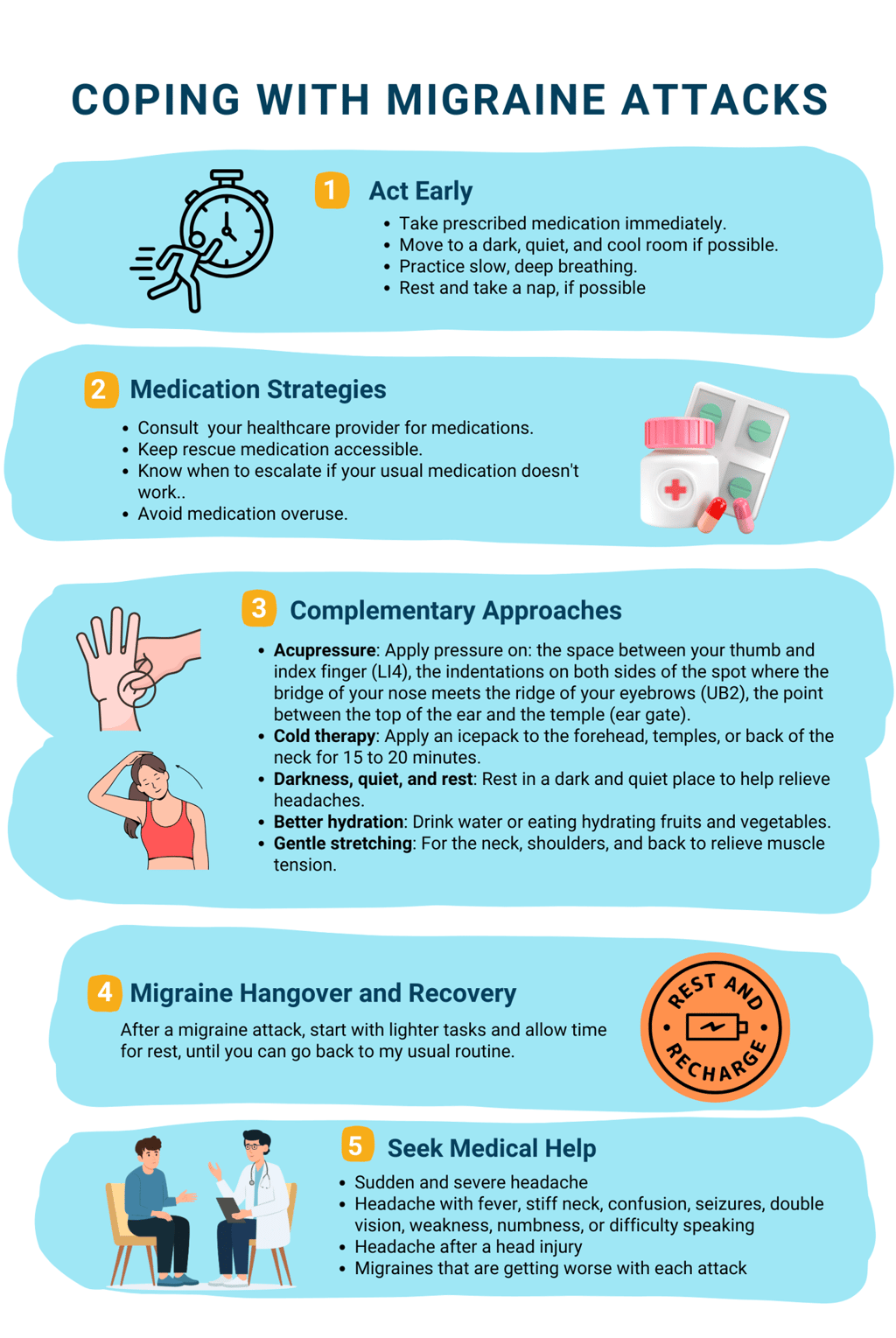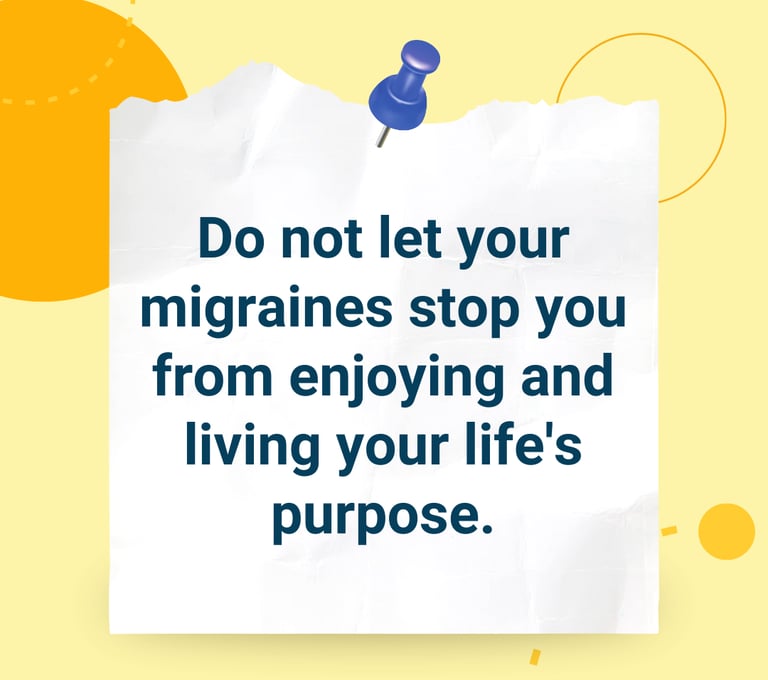Coping With Migraine Attacks: Tips From A Nurse Who Gets It
Feeling helpless during a migraine attack? You’re not alone. In this post, you'll learn gentle, effective, and evidence-based tips to help you manage migraine pain from a nurse who's also dealing with migraines.
HEALTH & WELLNESS MADE SIMPLE
Sheri Anne Maximille Cabañes-Madayag
6/29/20255 min read


Note: This post is for informational purposes only and is not a substitute for professional medical advice. Please speak with your healthcare provider about your specific health concerns.
Welcome Back to My Migraine Series
If you've read my previous post on migraine triggers, welcome back! If you're new here, I'm a registered nurse who shifted to being a virtual assistant and a content or copywriter. Throughout my career transition, one thing remained constant: living with migraines since college.
In my previous post, we explored the various migraine triggers and the strategies to prevent them. But anyone with migraines knows, even the best efforts to prevent migraines can sometimes fail. Knowing and avoiding what triggers migraines is only half the battle. Learning how to manage migraine attacks is just as important.
In this post, I’ll share practical tips to manage migraine symptoms and to recover after an attack. Drawing from both my nursing background and personal experience, I'll share the strategies that have worked best for me so I can carry on with my daily life, especially working night shifts and caring for my family.
When Prevention Isn't Enough: Managing Migraine Attacks


Migraine attacks can still occur despite our best efforts to prevent them. Here are the strategies that worked for me when a migraine attack happens:
1. Act Early
Don't wait until the headache gets worse. Intervene as soon as you see early symptoms of an upcoming migraine attack. The moment I start seeing tiny dots in one eye, I will:
Take prescribed medication immediately.
Move to a dark, quiet, and cool room if possible.
Practice slow, deep breathing.
Rest and take a nap, if possible
2. Medication Strategies
As a nurse, I will not be recommending medications. I strongly advise talking with your healthcare provider about the medications that will be most appropriate for you. Here’s how I approach medication use, based on my doctor’s advice:
Keep rescue medication accessible: My doctor recommended paracetamol, which has been effective in relieving my migraines. I keep a few blister packs of tablets in my purse, home office, bedside drawer, and medication cabinet.
Know when to escalate: If your usual medication doesn't work after a specified time, discuss it with your doctor. My doctor prescribed me a stronger medication in case my migraines are not relieved by paracetamol. Thankfully, I haven't taken it since paracetamol works fine for me. I also have medications for vomiting and dizziness on standby, in case I experience those symptoms along with the migraines.
Avoid medication overuse: Too much use of pain relievers can make you develop either tolerance or dependence. Most pain relievers can also have side effects, like kidney damage or liver injury. Always follow your doctor's advice regarding the dosage of your medications.
3. Complementary Approaches
You can also try alternative methods in addition to your medications to relieve migraine symptoms. Take note that these are not replacements for medical care. Discuss first with your doctor before trying out the approaches below.
Acupressure
Applying pressure to certain points in the body for a few seconds to a few minutes can help relieve headaches:
The space between your thumb and index finger (LI4). Apply pressure for about 5 minutes.
The indentations on both sides of the spot where the bridge of your nose meets the ridge of your eyebrows (UB2).
The point between the top of the ear and the temple (ear gate).
Cold therapy
Ice packs can help relieve migraines by numbing the area in pain. It can also relieve headaches caused by heat or sun exposure. Wrap an ice pack in a thin towel. Apply to the forehead, temples, or back of the neck for 15 to 20 minutes.
Darkness, quiet, and rest
Light and sound can make migraine headache worse. Rest in a dark and quiet place to help relieve headache. I use blackout curtains and play relaxing music in my bedroom so I can rest during a migraine attack.
Better hydration
Dehydration can trigger migraines. Improved hydration can help decrease the frequency of migraine attacks. Replenish fluids by drinking water or eating hydrating fruits and vegetables, like watermelon, cantaloupe, cucumbers, lettuce, and celery.
Gentle stretching
Stretching the neck, shoulders, and back can help relieve muscle tension and ease a migraine attack. Gentle stretching exercises that can help relieve migraines include side neck bend, seated forward fold, child’s pose, thread the needle, and downward-facing dog.
4. Migraine Hangover and Recovery
The last phase of migraine, also known as the postdrome or "migraine hangover," can last 1-2 days. Be gentle with yourself during this phase by taking things slowly. Don't rush to catch up on what you've missed. Instead, pace yourself by gradually returning to your usual activities. Rest if you feel dizzy, confused, or tired.
After a migraine attack, I start with lighter tasks and allow time for rest, until I can go back to my usual routine.
5. Seek Medical Help
As a nurse, I want to emphasize that certain symptoms warrant immediate medical attention. Call for help (911 or similar emergency hotline in your area), or have someone take you to the emergency room if you experience the following symptoms:
Sudden and severe headache
Headache with fever, stiff neck, confusion, seizures, double vision, weakness, numbness, or difficulty speaking
Headache after a head injury
Migraines that are getting worse with each attack


Final Thoughts: Managing Migraines with Kindness
Living with migraines while balancing career demands can be challenging. Over the years, I felt guilty for missing work and social events because of my migraine attacks. The guilt feelings added to the stress of experiencing migraine attacks, which worsened the headaches and made recovery even slower.
As I navigate through my experiences with migraines, I realized that to get better, I have to be kind to myself. I've learned to listen to my body by allowing it to rest and nourishing it with healthy foods and proper hydration. I turn to my family for support when I'm having migraine attacks. I have also been upfront with my clients in informing them if I have to miss work due to migraine attacks. When I started giving myself the grace and patience I needed, I noticed that my family, clients, and colleagues have also become more considerate and supportive of my recovery.
Remember that managing migraines requires patience and compassion. Some strategies that used to work before might not be effective today. Be open to making adjustments as your body and circumstances change.
Always keep in mind that being a migraine sufferer is just a small part of who you are. You are a whole person managing a neurological condition while pursuing your passions and reaching for your dreams. Do not let your migraines stop you from enjoying and living your life's purpose.
I hope these tips empower you to navigate your migraines with more ease and hope. I'd love to hear about your experiences with migraines and any strategies you've found helpful. Feel free to reach out through my contact page.
Disclaimer: This blog post is based on personal and professional experience and is intended for informational and educational purposes only. This is not a substitute for professional medical advice, diagnosis, or treatment. Always consult with your healthcare provider for specific questions or concerns regarding your health.
